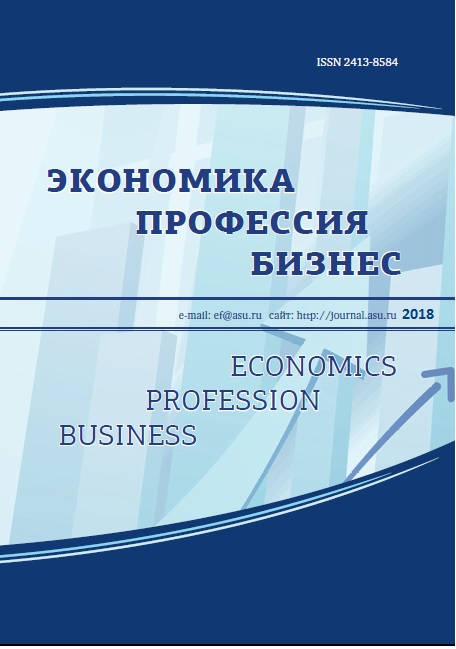ОХРАНА И ГУМАНИЗАЦИЯ ТРУДА: ПРИНЦИПЫ ИНТЕГРАЦИИ В ИНСТИТУЦИОНАЛЬНОЙ СТРУКТУРЕ СОЦИАЛЬНО-ТРУДОВЫХ ОТНОШЕНИЙ В ЦЕЛЯХ РЕШЕНИЯ ПРОБЛЕМ ТРУДОВОГО ОППОРТУНИЗМА НА ПРЕДПРИЯТИЯХ И В ЦЕПЯХ МЕЖФИРМЕННЫХ ВЗАИМОДЕЙСТВИЙ
Аннотация
Статья посвящена решению проблем преодоления трудового оппортунизма в сфере охраны труда, причины которого обусловлены сложившимися противоречиями между гуманистическими целями в этой сфере управления и экономическими интересами менеджмента как предприятий, так и их кооперационных объединений. Финансовую выгоду менеджмент видит исключительно в сокращении затрат на мероприятия по улучшению условий труда и обеспечению его безопасности. В результате вместо выгоды предприятия и кооперационные сети несут весьма ощутимые потери. Решение проблемы авторы видят в институциональной трансформации социально-трудовых отношений предприятий и сетей, направленных на усиление такого типа социально-трудовых отношений, как партнерство, и ослабление оппортунизма (институционального и трудового). Институциональную трансформацию предлагается осуществить на принципах гуманизации труда, которые на комплексной основе предлагается органично ввести в действующую систему охраны труда. Предлагаемый методический подход рекомендуется использовать и на отдельных предприятиях, и в сетях межфирменных взаимодействий, организованных и функционирующих в форме цепочек добавленной стоимости.
Скачивания
Metrics
Литература
Солженицын А. И. Национальная идея — сбережение народа // Гудок. 11.06.2005.
Армстронг М. Практика управления человеческими ресурсами. 8‑е изд-е. СПб., 2004. 832 с.
Генкин Б. М. Экономика и социология труда. 6‑е изд., доп. М., 2006. 448 с.
Зонова О. В., Нехода Е. В. Качество трудовой жизни в Российской Федерации: измерение и оценка. М., 2017. 232 с.
Мескон М. Х., Альберт М., Хедоури Ф. Основы менеджмента. М., 1992. 702 с.
Слезингер Г. Э. Труд в условиях рыночной экономики. М., 1996. 336 с.
Экономика труда и социально-трудовые отношения / под ред. Г. Г. Меликьяна, Р. П. Колосовой. М., 1996. 623 с.
Беляев В. И., Самсонов Р. А., Пяткова О. Н. Экспликация, таксономия и институциональная трансформация трудового оппортунизма в системе социально-трудовых отношений предприятия // Журнал экономической теории. № 4. 2015. С. 98–113.
Оппортунизм в структуре в структуре социально-трудовых отношений / колл. авт. под ред. В. И. Беляева, А. Н. Мельникова, Р. А. Самсонова. Барнаул, 2015. 236 с.
Карнаух Н. Н. Охрана труда. М., 2011. 380 с.
Самойлюк Т. А. Гуманизация труда — основное направление повышения качества трудовой жизни // Креативная экономика. 2014. Т. 8. № 5. С. 40–46.
REFERENCES
The Labor Code of the Russian Federation dated December 30, 2001 No. 197‑FZ (as amended on June 28, 2014). «Consultant Plus».
Solzhenitsyn, A. I. National idea — saving people. Gudok, 11.06.2005 (in Russian).
Armstrong, M. (2004) The practice of human resource management. 8th ed. Saint Petersburg, 832 (in Russian).
Genkin, B. M. (2006) Economics and sociology of labor. 6th ed., ext. Moscow, 448 (in Russian).
Zonova, O. V. & Nekhoda, E. V. (2017) Quality of working life in the Russian Federation: measurement and evaluation. Moscow, 232 (in Russian).
Meskon, M. H., Albert M. & Hedouri F. (1992) Fundamentals of Management. Moscow, 702 (in Russian).
Slezinger, G. E. Labor in a market economy. (1996) Moscow, 336 (in Russian).
Labor Economics and Labor Relations (1996) Ed. G. G. Melikyan & R. P. Kolosova. Moscow, 623 (in Russian).
Belyaev, V. I., Samsonov, R. A. & Pyatkova, O. N. (2015) Explication, taxonomy and institutional transformation of labor opportunism in the system of social and labor relations of an enterprise. Journal of Economic Theory, 4, 98–113 (in Russian).
Opportunism in the structure in the structure of social and labor relations (2015) Ed. V. I. Belyaev, A. N. Melnikova & R. A. Samsonov. Barnaul, 236 (in Russian).
Karnaukh, N. N. Occupational Safety and Health (2011). Moscow, 380 (in Russian).
Samoylyuk, T. A. (2014) Humanization of labor as the main direction of improving the quality of working life. Creative Economics, vol. 8, no 5, 40–46 (in Russian).
Copyright (c) 2018 Экономика Профессия Бизнес

Это произведение доступно по лицензии Creative Commons «Attribution» («Атрибуция») 4.0 Всемирная.
Авторы, публикующиеся в данном журнале, соглашаются со следующими условиями:
a. Авторы сохраняют за собой права на авторство своей работы и предоставляют журналу право первой публикации этой работы с правом после публикации распространять работу на условиях лицензии Creative Commons Attribution License, которая позволяет другим лицам свободно распространять опубликованную работу с обязательной ссылокой на авторов оригинальной работы и оригинальную публикацию в этом журнале.
b. Авторы сохраняют право заключать отдельные договора на неэксклюзивное распространение работы в том виде, в котором она была опубликована этим журналом (например, размещать работу в электронном архиве учреждения или публиковать в составе монографии), с условием сохраниения ссылки на оригинальную публикацию в этом журнале. с. Политика журнала разрешает и поощряет размещение авторами в сети Интернет (например в институтском хранилище или на персональном сайте) рукописи работы как до ее подачи в редакцию, так и во время ее редакционной обработки, так как это способствует продуктивной научной дискуссии и положительно сказывается на оперативности и динамике цитирования статьи









